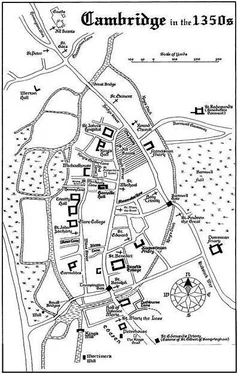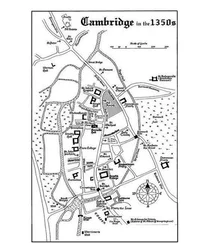‘I took her there last week,’ said Quenhyth, grabbing Bartholomew’s sleeve in an attempt to drag him away. ‘She was in the Market Square talking to some onions, and it occurred to me that there might be something amiss with her wits.’
‘Such an incisive diagnosis,’ muttered Redmeadow. ‘She talks to onions, and it crosses his mind that she might be addled.’
Quenhyth did not dignify the comment with a reply, and continued to address Bartholomew. ‘I escorted her to the Canons, but she ran away from them the next day. They told me she will leave Cambridge when she realises that whatever she is looking for is not here, and will head off to haunt some other town. They say they have seen many such cases since the plague.’
Bartholomew pulled away from Quenhyth, not liking the way his student had taken to manhandling him on occasions. He rummaged in his scrip and found some farthings. ‘Give her these,’ he said to Deynman. ‘Or better still, go with her to Constantine Mortimer’s shop, and ensure she buys bread – not ribbons or some such thing.’
‘But by that time you will have finished Isnard’s treatment,’ cried Deynman in dismay. ‘And I will not have seen what you did.’
‘Go and help her, Deynman,’ said Bartholomew softly, moved by the sight of the pitiful creature who rocked and sang to herself. ‘She needs you.’
Reluctantly, Deynman did as he was told. Bartholomew saw him bend to speak to her, then politely offer his arm, as he might to any lady in his rich father’s house. Physician Deynman would never be, but he had better manners and a kinder heart than his classmates. Bartholomew was about to resume his journey to Isnard when Deynman issued a shriek of horror.
Bartholomew’s blood ran cold. The woman had seemed more pathetic than violent, and he had thought she was not the kind to harm anyone who might try to help her. But he could have been wrong – and if he were, then he had forced Deynman to pay the price for his misjudgement. He stumbled across the ancient graves towards them, fearing the worst. But it was not Deynman who had come to grief; it was Bosel the beggar. The alms-hunter lay curled on his side in the long grass of the churchyard, his skin waxy with the touch of death.
‘Poisoned?’ asked Michael in surprise. He watched Bartholomew examine the beggar’s corpse as they waited for the Sheriff to arrive. ‘Are you sure? Who would poison Bosel? He is harmless.’
‘You would not think that if you were one of the people he had burgled,’ said Bartholomew. ‘Or if you were Thomas Mortimer, and had him claiming you deliberately ran over Lenne and Isnard.’
‘You think Mortimer killed Bosel?’ asked Michael. He rubbed his chin, nodding to himself. ‘Ridding yourself of an inconvenient witness is a powerful motive for murder.’
‘I thought he had more sense, though,’ said Bartholomew, prising open Bosel’s mouth to show Michael the discoloured tongue and bloodied gums. ‘He must have known he would be the obvious suspect.’
‘Desperate men are not always rational,’ replied Michael, looking away quickly before he lost the illicit early breakfast he had eaten in his room before mass that morning. Bosel’s mouth was not a pretty sight. ‘But Thomas is constantly drunk these days. I am surprised he could carry out a murder using as discreet a means as poison.’
‘His family, then,’ said Bartholomew. ‘His brother Constantine and all those nephews and cousins. Still, I am surprised. Poisoning Bosel is an utterly stupid thing to do.’
Michael agreed. ‘Poor Bosel. I shall miss his insolent demands for spare change on the High Street. What killed him?’
‘He ate or drank something caustic that burned his mouth and innards,’ said Bartholomew. ‘It would not have been an easy death.’
‘She might have killed him,’ suggested Quenhyth, nodding to where Deynman was sitting on a tomb with his arm around the shoulders of the madwoman. It was not quite clear who was comforting whom, and Deynman seemed to be deriving as much relief from the warm, close presence of another living person as was the woman herself. ‘She was discovered next to his corpse, after all.’
‘She does not have the wits,’ said Michael, although Bartholomew remained sceptical. His alarm when he had thought she might have harmed Deynman was still bright in his mind.
‘She says she was keeping his body company,’ said Redmeadow, eyeing her uneasily, as if he did not know what to believe. ‘She claims she found him at dawn this morning, and did not want him to be alone. She was waiting for a priest to come and relieve her of her vigil. She told me Deschalers the grocer gave Bosel his new clothes, though. Perhaps that is significant.’
Bartholomew did not see why it should be. ‘Bosel was a beggar, and people were always giving him things. It is how he made his living.’
‘I do not see Deschalers poisoning him to get them back, either,’ said Michael, surveying what had once probably been some decent garments, but that had become soiled and ragged in Bosel’s possession. He glanced up and saw the Sheriff striding towards him. ‘But this is his problem, not mine. The victim here is a townsman.’
Tulyet listened in silence to Bartholomew’s opinion that Bosel had died from ingesting something highly caustic. The physician pointed out an empty wineskin and a pool of vomit near the body, which he thought indicative that Bosel had died fairly soon after swallowing the substance. He did not possess the skill claimed by some of his medical colleagues to determine an exact time of death, but a lump of bread in Bosel’s scrip was unmistakably the kind handed out by the Canons of St John’s Hospital at seven o’clock each evening. Therefore Bosel had died later than seven. The body was icy cold, suggesting it had been dead several hours. Tulyet bullied and cajoled Bartholomew until he had the physician’s best guess: Bosel had probably died late the previous evening, most likely before midnight.
Tulyet frowned. ‘Did he do this to himself? Is he a suicide?’
‘I do not see why,’ said Bartholomew. ‘First, he had no funds to buy poison. And secondly, I imagine he was going to demand money from the Mortimers – by offering to retract his story about the incident with Lenne and Isnard. His future was looking rosy.’
‘It was,’ agreed Tulyet thoughtfully. ‘The obvious conclusion is that Thomas Mortimer did this: mixed poison with wine and gave it to Bosel to drink. However, if Bosel was murdered between seven and midnight, then Mortimer is innocent. He was at a meeting of the town burgesses during those hours, discussing repairs to the Great Bridge. I know, because I was there.’
‘One of his family, then,’ said Michael. ‘God knows, there are enough of them. And do not forget that they now include his nephew, Edward, whom we know is a killer.’
‘Edward was at this meeting, too,’ said Tulyet. He grimaced. ‘And so was young Rob Thorpe.’
‘Thorpe and Edward,’ mused Quenhyth, who was listening uninvited to their discussion. ‘The two felons who were found guilty by the King’s Bench but who then secured themselves pardons.’
‘Quite,’ said Tulyet bitterly. ‘Two ruthless criminals given the liberty to roam free in my town. I have enough to worry about, without watching them day and night.’
‘You should not have recommended them for a King’s Pardon, then,’ said Michael tartly. ‘I made some enquiries about that, and learned it was a letter from the Sheriff of Cambridgeshire that tipped the balance in their favour. Without that letter, they would still be in France.’
Tulyet shot him a withering look. ‘That may well be true, but I was not Sheriff when their case came under review. Stephen Morice was. He was the one who claimed the town had no objection to their release, not me.’
Читать дальше












